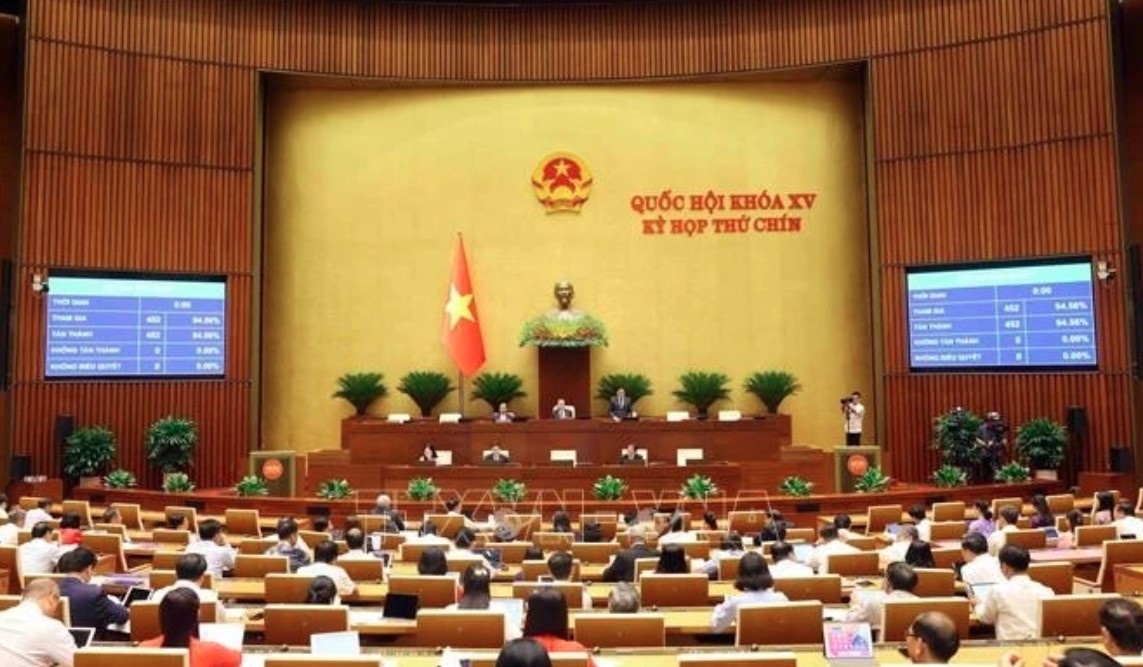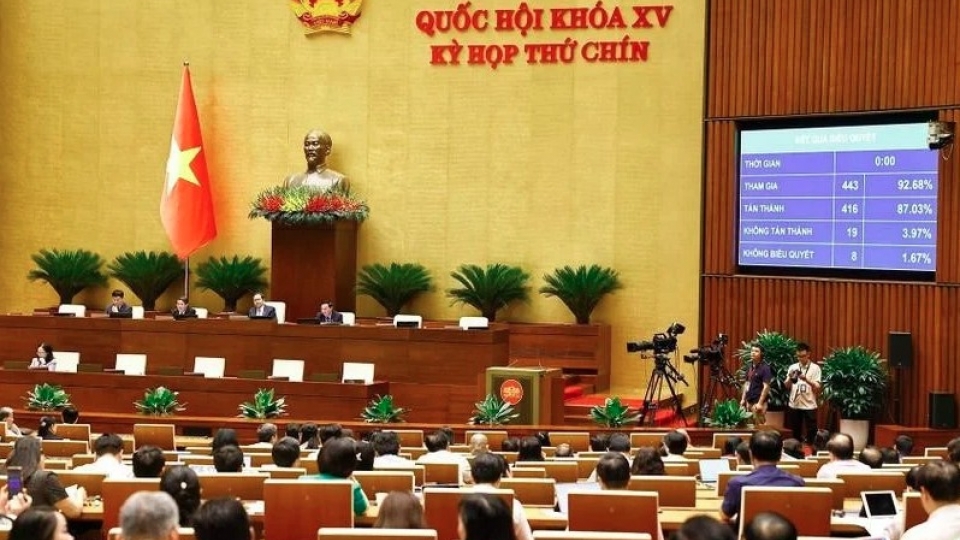First phase of 15th NA 9th session features highlights of historic significance
Concluding after 22 days of deliberations, the first phase of the 15th National Assembly (NA)’s ninth session has achieved notable milestones, delivering outcomes of historic importance.
Decisions on critically important matters
During this phase, the NA voted to adopt eight resolutions, paving the way for amendments to several articles of the 2013 Constitution, preparing for the election of deputies to the 16th NA and People’s Councils at all levels for the 2026–2031 term, and making decisions on other urgent matters in line with the Politburo’s resolutions. On the very first day of the session, May 5, lawmakers voted to pass a resolution on amending and supplementing a number of articles in the 2013 Constitution and another on establishing a committee tasked with drafting these amendments.
These constitutional amendments aim to reorganise and streamline the political apparatus, focusing on the roles of the Vietnam Fatherland Front, socio-political organisations, the delineation of administrative units, and the organisation of local administration structures.
The newly established drafting committee has already held two meetings, with members and relevant bodies rigorously overseeing the implementation of assigned tasks, particularly the collection of feedback from the public and sectors.
As of 8pm on May 26, over 17.1 million citizens had submitted their opinions via the VNeID platform. This extensive consultation process will inform the committee’s refinement of the draft resolution to be presented to the NA for final approval before June 30, ensuring it comes into effect starting July 1.
On May 21, the NA also approved a resolution to shorten the current term of the 15th NA and local People’s Councils for the 2021–2026 term, as well as to set March 15, 2026 as the election date for the 16th NA and local People’s Councils for the 2026–2031 term.
Under this arrangement, the inaugural session of the new NA must convene within 60 days since the election, while the first session of new People’s Councils must convene within 45 days.
In terms of legislative work, the assembly thoroughly discussed and provided feedback on a range of draft laws and resolutions during this phase, laying the groundwork for further refinement.
During the group discussions on May 8 regarding a draft law on amendments and supplements to the Law on the Organisation of the People’s Courts, a draft law on amendments and supplements to the Law on the Organisation of the People’s Procuracy, and the draft amended Law on Inspection, State President Luong Cuong stressed that the goal of judicial reform is to serve and protect the people, address bottlenecks and problems in reality, and ensure readiness to support national development.
He stressed that amending the Constitution and reviewing around 60 draft laws and resolutions during the 9th session represent an enormous workload that must be approached with the utmost precision.
On the sidelines of the session, Trinh Tu Anh, a deputy from the Central Highlands province of Lam Dong, noted that this phase had successfully tackled an exceptionally large and historically significant agenda, demanding both thorough deliberation and strategic foresight.
Institutionalising the “four pillars”
The Politburo recently realesed four key resolutions, collectively referred to as the “four pillars” for national advancement in the new era. They consist of Resolution No. 57-NQ/TW, dated December 22, 2024, on breakthroughs in science - technology development, innovation and national digital transformation; Resolution No. 59-NQ/TW (January 24, 2025) on international integration in the new context; Resolution No. 66-NQ/TW (April 30, 2025) on reforming law making and enforcement to meet national development needs in the new era; and Resolution No. 68-NQ/TW (May 4, 2025) on the development of the private economic sector.
Reflecting these strategic directions, the legislature, from the outset of this session, has engaged in in-depth and meticulous discussions on related draft laws and resolutions.
On May 17, 429 out of 434 deputies present (accounting for 89.75% of all deputies) voted in favour of a resolution on special mechanisms and policies for accelerating the growth of the private economic sector.
That same day, deputies also passed a resolution on special mechanisms and policies for creating breakthroughs in law making and enforcement.
During group discussions on three draft laws – the law on science, technology and innovation; the law amending and supplementing a number of articles of the law on product and goods quality; and the revised atomic energy law, NA Chairman Tran Thanh Man underscored the need for synchronised efforts across the NA, Government, ministries, and local authorities.
He said that the guiding principle of the Party General Secretary and the Party Central Committee is to be open, resolute, and thorough in removing current obstacles. All 34 laws being considered in this session aim to deliver on this vision, the top legislator noted.
On the sidelines of the session, Truong Trong Nghia, a deputy from Ho Chi Minh City, said that while the “four pillars” address all socio-economic matters, they require comprehensive institutionalisation. One of the Government’s most critical tasks is to ensure this spirit of reform reaches down to the grassroots level, he opined.
The second phase of the session will focus on finalising the remaining items on the agenda. This includes a second reading and adoption of the constitutional amendments, reviewing the plan for merging provincial-level administrative units, conducting question-and-answer sessions, and voting on 34 laws and 21 resolutions.




